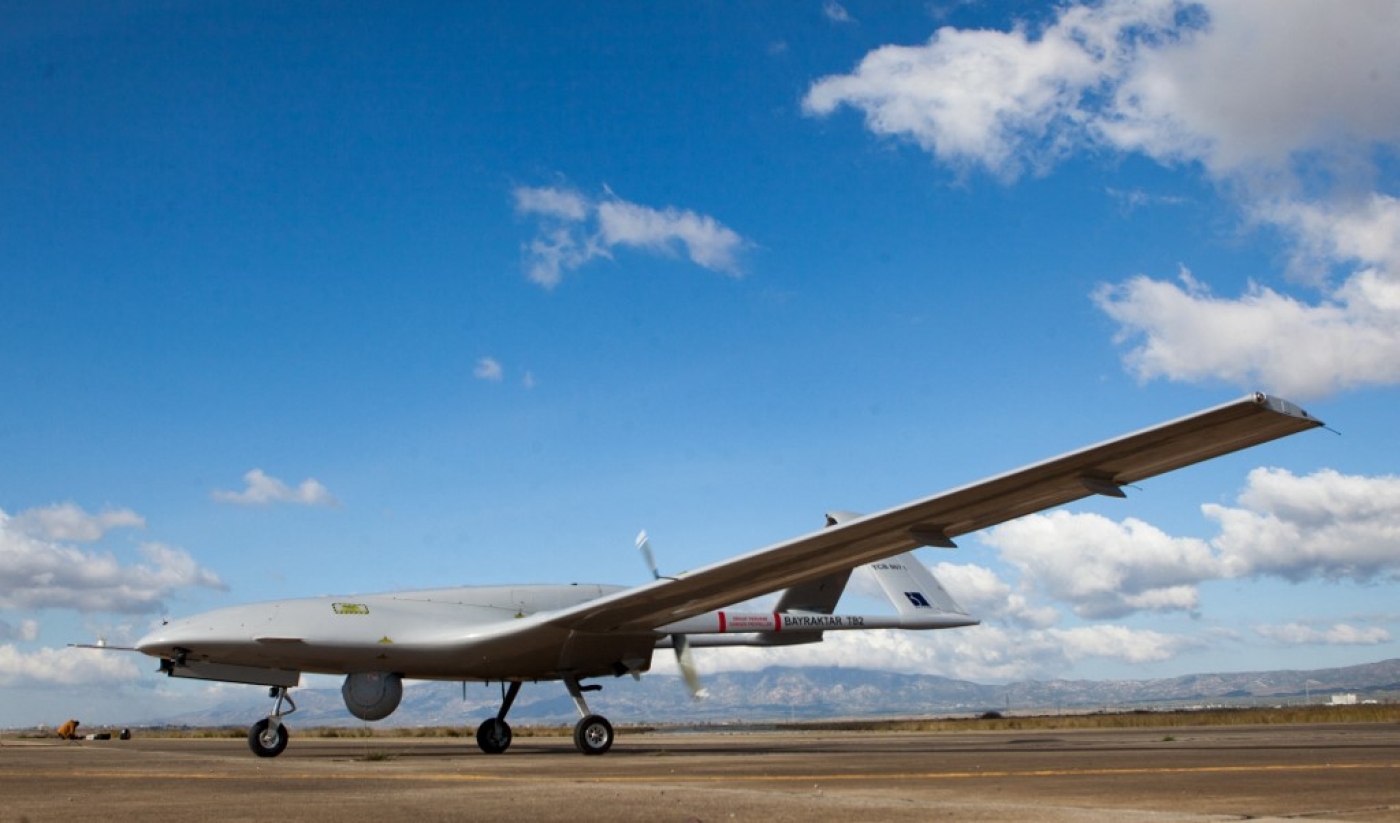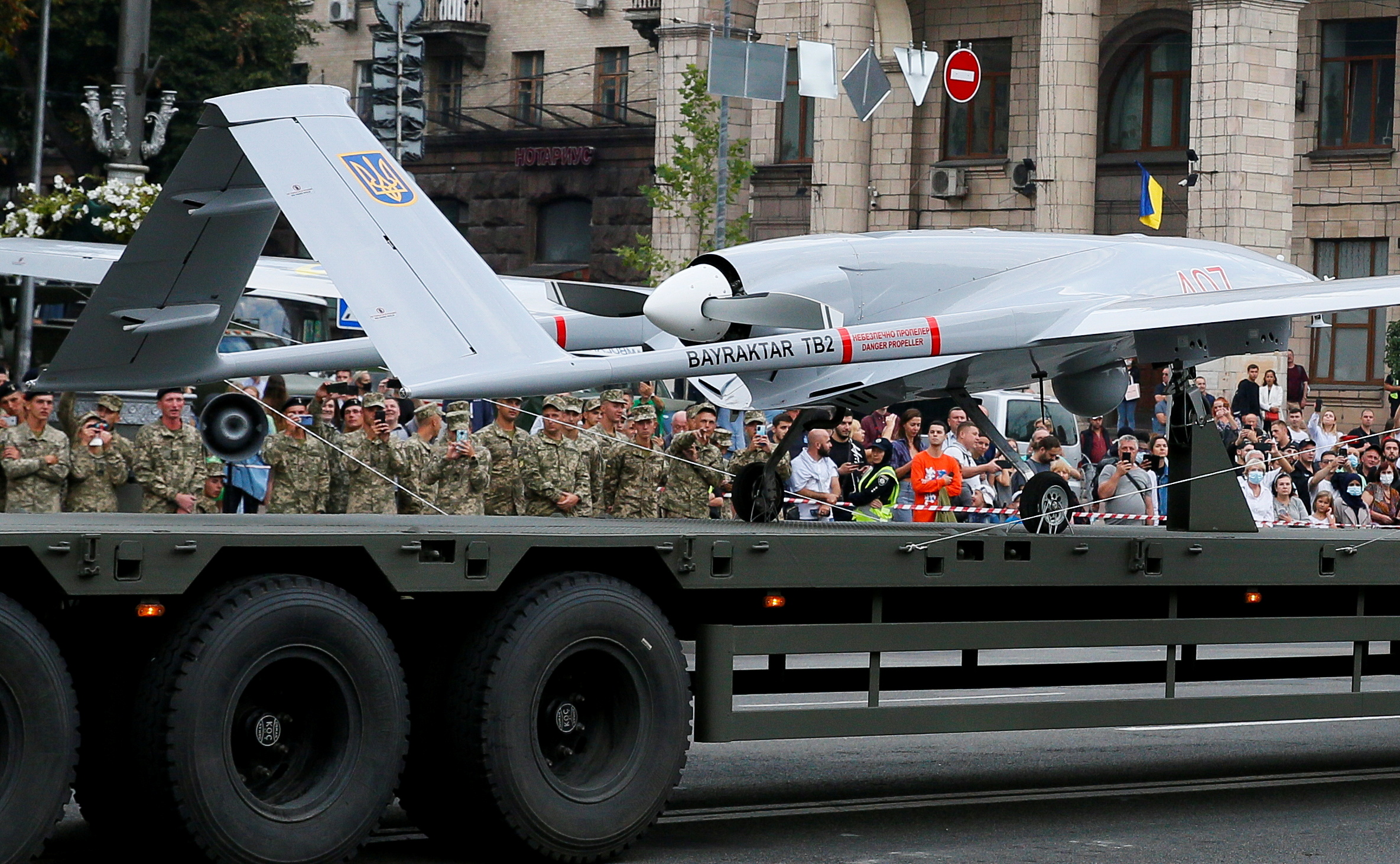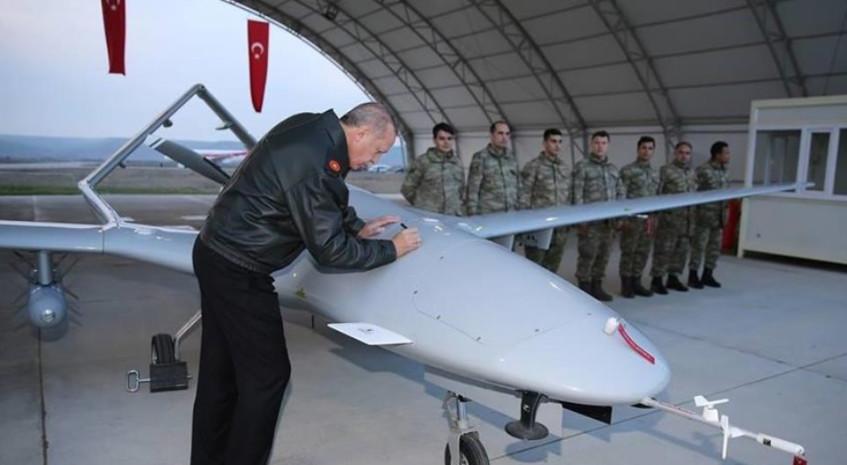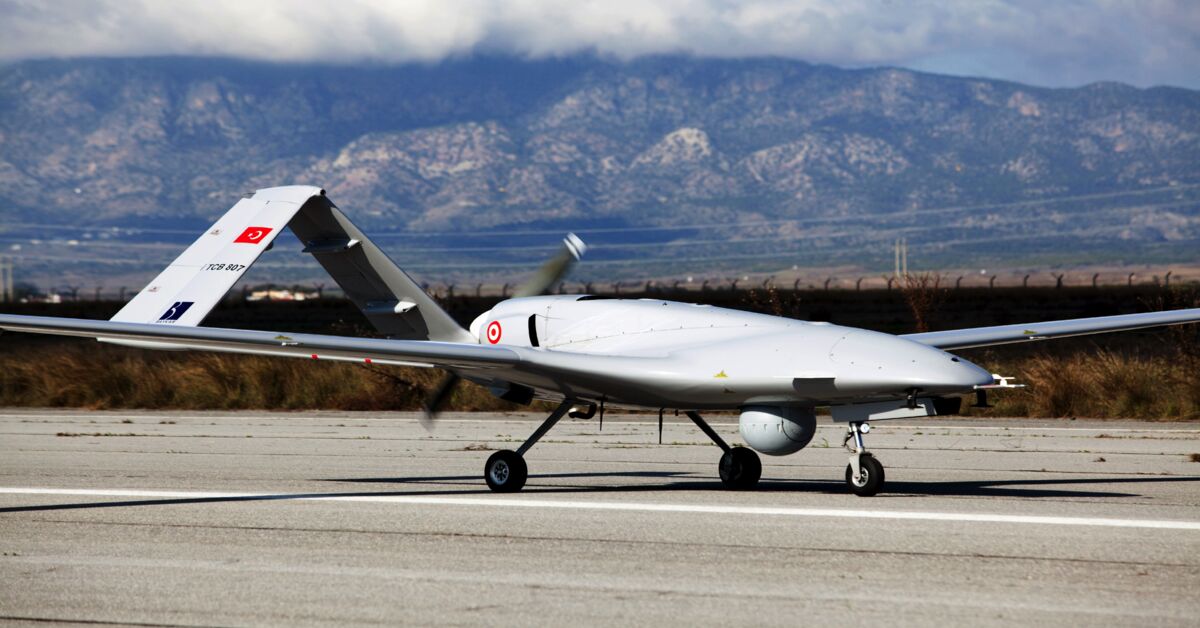Turkish President Recep Tayyip Erdogan has deepened Ankara’s ties to African countries with a string of drone sales

The Turkish-made Bayraktar TB2 drone seen in 2019 at Gecitkale military airbase in the self-proclaimed Turkish Republic of Northern Cyprus (AFP)
21 October 2021
Middle East Eye
Turkish President Recep Tayyip Erdogan’s four-day trip to Africa this week, with stops in Nigeria, Angola and Togo, barely registered in the Turkish news.
Instead, Turkish state-run outlets took on a PR tone, stressing the country’s humanitarian efforts and colonialism-free approach to the continent, and echoing Erdogan’s own comments in the Angolan capital of Luanda on Monday.
“As Turkey, we reject western-centred orientalist approaches to the African continent,” he told Angolan President Joao Lourenco. “We embrace the peoples of the African continent without discrimination.”
Turkey’s courtship of Africa is not new. With its geographic proximity, large consumer base and natural resources, its countries have offered Turkey an opportunity to realise both its domestic and regional aims.
Over the past two decades, Turkey has steadily expanded its diplomatic missions, boosted trade volume and increased humanitarian efforts in African countries.
Now with a string of drone sales spreading Turkish drones across Africa and recent interventions in two African countries, some analysts say Turkey may be moving beyond its soft power approach to become a game-changing actor in African politics.
“Its role in Somalia, West Africa and, more recently, its military engagement in Libya clearly shows that Turkey wants to expand its influence across the continent,” Ibrahim Bachir Abdoulaye, a researcher on Turkey-Africa relations at the University of Bayreuth in Germany told Middle East Eye.
Spread of Turkish drones

In recent years, Turkish drones have gained popularity in the international market, attracting even western countries like Ukraine, Poland and reportedly even the UK.
They have also spread to African shores. In late September, the first batch of Turkish armed drones arrived in Tunisia despite tensions in bilateral relations after Tunisian President Kais Saied seized control of the country in July.
Morocco was next, expanding its military inventory with Turkish drones. This procurement came as tensions flared between Algeria and Morocco – and despite Turkey’s seemingly good relations with Algeria.
Earlier this month, African Intelligence reported that the Rwandan army has been eyeing Turkish drones for its military operations in Mozambique. Despite no official comment from either side about the drone sales, Turkey has already developed relations with the country, constructing Rwanda’s biggest indoor stadium in its capital Kigali.
Another country looking at Turkish drones is Ethiopia. While details have been kept under wraps as a result of the rift between Addis Ababa and Cairo over the Grand Ethiopian Renaissance Dam project, Reuters reported last week that Ethiopia and Turkey had reached a sales agreement.
With this deal, Turkey would add yet another investment to its Ethiopia portfolio, which already includes textile factories, a railway and several infrastructure companies, and makes Turkey the second-largest foreign investor in the country behind China.
Finally, Nigeria has expressed interest in Turkish drones, with Bello Muhammad Matawalle, the governor of the state of Zamfara, saying they would help the Nigerian army to combat organised crime.
Turkey’s interest in Africa
Turkey’s efforts to expand its reach in Africa date back to 2005, which the Turkish government declared “the year of Africa”. With it came the launch of diplomatic missions, business deals and flights.
Over the past 19 years, Erdogan has travelled to nearly 30 African countries, more visits than any other non-African leader. Turkey has increased its diplomatic missions on the continent from 12 in 2002 to 43 in 2021, while Turkish Airlines flies to 60 destinations in 39 different African countries, making Istanbul a transit hub between Africa and the world.
Moreover, the value of bilateral trade increased to $25bn last year, a figure that stood at around $4.3bn when Erdogan came to power in 2003.
‘Turkey is attracted by the immense wealth underground and Africa’s economic potential’
– Ibrahim Bachir Abdoulaye, University of Bayreuth
Turkey has also been using some of its state-run institutions for humanitarian and educational aid. For instance, the Turkish government agency which is responsible for helping Turks living abroad has awarded nearly 6,000 African students with full scholarships to Turkish universities over the past decade.
Experts say Turkey’s focus on Africa has been about achieving economic success.
“Turkey is attracted by the immense wealth underground and Africa’s economic potential with a market of over a billion people,” said Abdoulaye, adding that there are significant opportunities, in particular, for medium and large Turkish companies.
However, Emre Calıskan, a fellow at the Foreign Policy Center in Ankara, said that Turkey has mostly invested in medium-sized companies, rather than larger ones with higher volumes of trade.
“The boom in Turkish-African trade volume is an illusion,” he said.
But he said that defence industry sales would be a real boom for Turkey’s investments in Africa because that kind of trade requires “know-how sharing, technology transfer and deeper cooperation”.
A new African strategy?

With its ongoing investments in Africa, and particularly with its drone sales, which have changed the balance of power in favour of the buyers, observers are asking whether Turkey is now competing with international powers such as France, the US, Russia and China for influence.
This question has come to the fore since Turkish drones enabled Libya’s internationally recognised government to halt eastern commander Khalifa Haftar’s advance towards the capital Tripoli last year.
Similarly, the Turkish drone-backed Azerbaijani army managed to save its occupied lands from Armenia in 2020, in the war for Nagorno-Karabakh. As several analysts pointed out, Turkish drones helped change the tide of the war.
‘Turkey has never had such a “do what I want” or “do as I say” policy with Africa’
– Volkan Ipek, Yeditepe University
Turkey’s success in Libya, said Abdoulaye, revealed the country’s capacity to “face its rivals and establish economic and political influence over certain African countries”.
Calıskan agreed, calling Libya a turning point after which Turkey started becoming a military power rather than simply offering humanitarian aid in Africa.
“Turkey has a vision now. Ankara wants to develop its relations with Libya’s neighbouring countries and to establish military bases to become a military power in the continent’s north,” he said.
But he believes that Turkey is not interested in holding military power beyond the Libyan sphere because of the financial costs it would incur. “For instance, China sells weapons to African countries but gives loans as well. Turkey is unable to do so due to its deteriorating economy,” he said.
Volkan Ipek, an assistant professor at Yeditepe University in Istanbul, said he believes Africa is a “rehabilitation field” for Turkish foreign policy, which has been stalemated with developments in its neighbouring countries, primarily in Syria.
Turkey, Ipek said, has the upper hand against European powers in the continent because it doesn’t have a colonial legacy. “Turkey has never had such a ‘do what I want’ or ‘do as I say’ policy with Africa,” he said.
But despite this advantage, he said he doesn’t believe Turkey has a bigger strategy in Africa beyond bilateral trade agreements.
In any case, Erdogan is keen to deepen Turkey’s relationship with African countries. His last stop on Wednesday was oil-rich Nigeria, where he signed seven agreements with his counterpart Muhammadu Buhari to boost bilateral trade and investment worth over $2bn.
Turkey boosts drone sales to Africa in a move set to stoke tensions
Oct 15, 2021
Pars Today

Turkey has increased its export of combat drones to Morocco and Ethiopia in a move set to anger Egypt and Sudan, Egyptian security sources say.
Egypt, which is at odds with Ethiopia over a hydropower dam, has already asked the United States and some European countries to help Cairo freeze any armed drone deal between Ankara and Addis Ababa, the sources told Reuters.
The export to the African country risks creating friction in already strained relations between Ankara and Cairo.
A third unnamed Egyptian source said any agreement would have to be raised and clarified in negotiations between Cairo and Ankara as the two try to mend relations.
Although several sources gave details about the purported deals on armed drones, the three involved countries – Turkey, Ethiopia, and Morocco – have not yet formally announced any deals on combat drones.
A Turkish official was quoted as saying that both Addis Ababa and Rabat had requested purchases of Turkey’s Bayraktar TB2 drones in deals that could also include spare-part guarantees and training.
One unnamed diplomat said Morocco had already received the first shipment of armed drones it ordered back in May, adding that Ethiopia also plans to receive the aircraft but the status of that order is less clear.
Poland, which is Turkey’s NATO partner, and Ukraine have already ordered Turkish combat drones, which according to military experts, are less expensive than market rivals manufactured in Israel, China, and the United States.
According to official figures, Turkey’s defense and aviation exports have increased sharply to Morocco and Ethiopia during the past two months.
In an attempt to ease its economic problems, Turkey needs to boost its sales of combat drones, whose growing importance in modern warfare is increasingly evident.
Last year, Ankara successfully used its armed drones in Libya to defend the Tripoli-based government against eastern forces, led by renegade general Khalifa Haftar, who was supported by Egypt and the United Arab Emirates (UAE).
In Nagorno-Karabakh conflict, the Turkish drones helped Ankara’s ally Azerbaijan defeat Armenia-backed forces.
According to the Turkish Exporters Assembly, defense and aviation exports to Ethiopia increased to $51 million in the first three months of this year, from $203,000 in the same period in 2020, with a jump in August and September.
The figures by the assembly also show that exports to Morocco were $78.6 million in the same period – with $62 million in September alone – compared to $402,000 last year.
It also shows that overall Turkish defense and aviation exports totaled $2.1 billion in the first three quarters of this year, up 39 percent from $1.5 billion last year
Turkey’s Erdogan pivots to Africa for trade

October 28, 2021
AFP
Turkish President Recep Tayyip Erdogan enters this weekend’s G20 summit in Rome fresh off an African tour aimed at cementing lucrative partnerships during another spell of tensions with the West.
From mining to health, energy to infrastructure, Turkish businesses are popping up across the resource-rich continent and signing deals hailed as a “win-win”.
This pivot away from traditional European markets has already seen Turkey’s trade with Africa balloon from $5.4 billion when Erdogan came to power in 2003 to $25.4 billion last year.
Back from a visit to Angola, Togo and Nigeria — and in the middle of another diplomatic spat with the West — Erdogan told an African business forum last week that Turkey wanted to see trade triple in the coming years.
One of the most strategic and controversial areas of this cooperation is defence, where Turkey has been flaunting the game-changing successes of its military drones on the battlefields of countries such as Libya.
“Defence industry products offer a new opportunity,” said associate professor Mursel Bayram of Ankara’s Social Sciences University.
– ‘Afro-Eurasian’ nation –
Erdogan once described Turkey as an “Afro-Eurasian” nation and has visited the most African countries — 30 out of 54 — of any non-African head of state.
The number of Turkish embassies in Africa has grown from 12 to 43 since 2002 while the national flag carrier, Turkish Airlines, flies to over 60 African destinations.
“The main reason for our increased interest in Africa is that we saw the potential there,” Foreign Economic Relations Board chief Nail Olpak told AFP.
“Maybe we saw it a little late, but we did.”
Olpak pointed to the young, fast-growing continent’s huge need for infrastructure, from electricity to bridges, drinking water to waste disposal, where Turkish companies excel.
Turkish firms have already built a mosque in Ghana, an indoor stadium in Rwanda, an Olympic swimming pool in Senegal, and are working on an airport in Sudan.
Algeria, meanwhile, is one of Turkey’s main suppliers of liquefied petroleum gas, offering Ankara a chance to “reduce our dependence on Russia and Iran”, said Bayram.
– ‘Like a soaring arrow’ –
For African officials, Turkish companies offer jobs and reasonably priced goods the quality of which often compares favourably to those from China — one of the continent’s most aggressive investors.
“We see Turkey as a serious friend who wants to invest in Africa,” Tanzania Industry and Trade Minister Kitila Mkumbo told the Africa business forum in Istanbul, attended by more than 40 African and Turkish ministers.
“Africa is no longer interested in aid, Africa is interested in investment,” Mkumbo said in a speech which received rapturous applause.
Uganda Investment Authority board chairman Morrison Rwakakamba was among those drumming up trade, expressing hope for Turkish interest in agriculture and agro-processing in his east African country,
“With Turkey, the relationship is very much based on mutuality and win-win, and that is a very good starting point,” Rwakakamba told AFP.
The bid to expand African trade comes with the Turkish lira steadily sinking to new lows, which makes exports even more competitive.
“It is like a soaring arrow,” said Muzaffer Suat Utku, executive vice president in charge of international banking at Turkey’s Aktif Bank, which brands itself as the “bank of the African foreign trade”.
“Our exporters and investors are constantly having meetings in Africa. I believe relations will reach a much more substantial level,” Utku said.
– Different from China –
Some analysts believe Ankara has developed more goodwill in Africa than has Beijing, whose projects have been known to put developing countries into heavy debt.
“If we compare Turkey with China, we can see that on the ground there are different outcomes for the local people,” said Federico Donelli, international relations researcher at the University of Genoa.
“There is more involvement of local peoples and in some cases, there is also an exchange of know-how between Turkey and the local population,” Donelli told AFP.
Erdogan’s assertive foreign policy has been a source of rising tension with the West, with critics accusing the Turkish leader lacking a strategy.
But in Africa, experts say Turkey is following a more considered approach.
“There is a long-term plan, it’s not a short-term plan,” Bayram said, pointing to investments in healthcare, education, training, and the role of women
